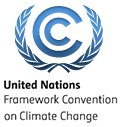Doha climate talks under the Major Economies Forum (MEF)?
 The US is looking to shift policy elements from the Doha Climate talks out from the UN framework and into the MEF, the platform of the world’s largest CO2 emitters. For its part, Brussels sees the MEF as a complement rather than an alternative to the United Nations Framework Convention on Climate Change (UNFCCC). “Ideally we would like to see as much happening inside the UNFCCC as possible”, said Michael Starbæk Christensen, the deputy head of cabinet for EU Climate Commissioner Connie Hedegaard, “but if we can engage with the US in other forums, it is the action that counts”.
The US is looking to shift policy elements from the Doha Climate talks out from the UN framework and into the MEF, the platform of the world’s largest CO2 emitters. For its part, Brussels sees the MEF as a complement rather than an alternative to the United Nations Framework Convention on Climate Change (UNFCCC). “Ideally we would like to see as much happening inside the UNFCCC as possible”, said Michael Starbæk Christensen, the deputy head of cabinet for EU Climate Commissioner Connie Hedegaard, “but if we can engage with the US in other forums, it is the action that counts”.
As to the possible consequence of this shift, the position of the UNFCCC’s secretary-general Christiana Figueres was uncompromising. She argued that MEF forums have provided a helpful and informal space in which new ideas put forward within the UNFCCC could be more easily clarified, but the only place where formal negotiations are held and decisions take place is the UNFCCC.
“Climate change requires all countries to act, but the central question of who should do how much can't be sidestepped by shifting the discussion outside the UN,” added Lies Craeynest, a senior advisor for Oxfam. Only a fair deal agreed at the UN could achieve this, she said.
The MEF is a successor to the Major Economies Meetings set up by President Bush, and historically criticised by a number of governments for undermining the UN process. Its participants include countries like Australia, Brazil, Canada, China, the European Union, France, Germany, India, Indonesia, Italy, Japan, Korea, Mexico, Russia, South Africa, the United Kingdom, and the United States.





